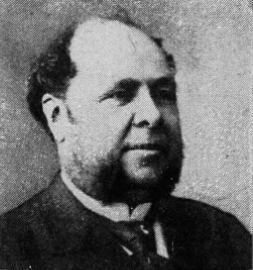
Patrick Cabanel is a French historian, director of studies at the École pratique des hautes études and holder of the chair in Histoire et sociologie des protestantismes. He mainly writes on the history of religious minorities, the construction of a secularised French Republic and French resistance to the Shoah.
René Rémond was a French historian, political scientist and political economist.

Jean-Guenolé-Marie Daniélou was a French Jesuit and cardinal, an internationally well known patrologist, theologian and historian and a member of the Académie française.

Paul Allard was a French archaeologist and historian.
Antoine Guillaumont was a French archaeologist and Syriac scholar. He held positions notably at the École pratique des hautes études and the Collège de France, and was a member of the Académie des Inscriptions et Belles-Lettres. His archaeological writings are related to the site of Kellia in Lower Egypt. As a Syriacist he was most interested in early monasticism and in the reception of the writings of Evagrius Ponticus.
Michel Meslin was a professor at and president of the Université de Paris-Sorbonne. He established the Institut de Recherche pour l'Etude des Religions (IRER). A specialist in late antiquity, the history of Christianity and anthropology of religion, he published several works on these and other subjects.
Jean Baubérot, is a French historian and sociologist specializing in sociology of religions. He is the founder of the sociology of secularism.
Jean Séguy was a French sociologist of religions.
Émile Poulat, was until 1954 a Catholic priest, associated with the Prêtres Ouvriers movement, and thereafter a French historian and sociologist. Director of Studies at the École des hautes études en sciences sociales, he was also director of research at CNRS and historian of the contemporary church. He was a founding member of the Group of Sociology of Religion, director and member of the editorial boards of several journals including Politica Hermetica. His research concentrated on the conflict between Catholic culture and modern culture in the history of contemporary Catholicism.
Karima Dirèche is a French Algerian historian specialising in the contemporary history of the Maghreb. From September 2013 to August 2017, she has been the director of the Institute for Research on the Contemporary Maghreb in Tunis.
Alain Ducellier was a French historian and professor emeritus at Université de Toulouse-Le Mirail who specialized in Byzantine studies and Christianity in the middle east. He was the author or editor of more than 40 books.

Albert Pierre Jules Joseph Bayet, born in Lyon on 1 February 1880, and died in the 7th arrondissement of Paris on 26 June 1961, was a French sociologist, professor at both the Sorbonne and the École pratique des hautes études.
Charles Moeller was a Belgian theologian, literary critic and Roman Catholic priest.

Joseph Yacoub is a historian and political scientist of Assyrian origin. His family moved from Salmas-Urmia, district in Iranian Azerbaijan and took refuge in Georgia during the First World War. From Tiflis/Tbilissi his family migrated to Syria which was during this time under French Mandate. His mother tongue is Aramaic and his first environment language is Arabic.His working language is mostly French.
Claude Lepelley was a 20th-21st-century French historian, a specialist of late Antiquity and North Africa during Antiquity. His thesis, Les cités de l'Afrique romaine au Bas-Empire, defended in 1977 under the direction of William Seston, profoundly changed the understanding of the urban world in the 3rd and 4th centuries; far from declining, the cities of Africa had some prosperity.

Xavier de Montclos was a 20th–21st-century French historian, a specialist of the history of religions and particularly christianity.
Daniel Moulinet is a French priest and historian, professor of contemporary history at the Catholic University of Lyon.
Pierre Maraval was a French historian and academic, specialising in the Early Christianity and of Late antiquity.
The Prix Bordin is a series of prizes awarded annually by each of the five institutions making up the Institut Français since 1835.

Madeleine Scopello is a French historian of religion. She is director of research at the CNRS and director of studies at the École pratique des hautes études. She also teaches at the Institut catholique de Paris, Faculty of History.






